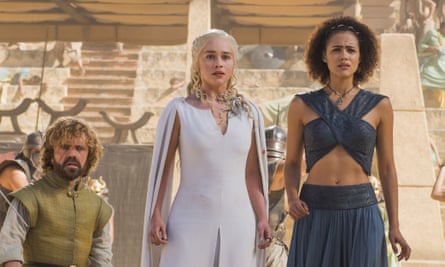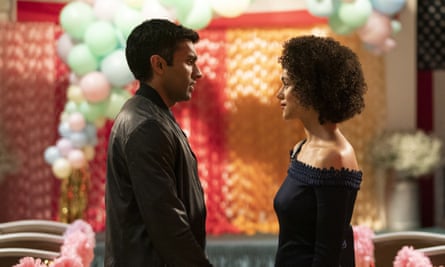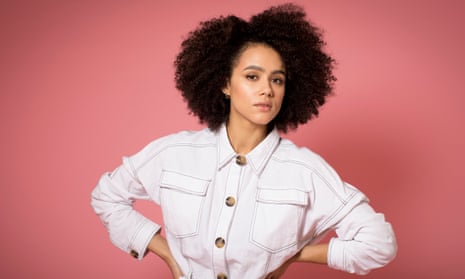Nathalie Emmanuel arrives mildly flustered. There’s been a last minute change of plans and, as we walk, she talks about a disappointing meal she had the night before at one of her favourite vegan restaurants. As she sits down in a London cafe with a matcha almond latte, I wonder if this could this be the start of a showbiz rant. But it soon becomes obvious that that isn’t Emmanuel’s style. Despite spending much of the past decade in what many consider the greatest TV series ever, Game of Thrones, she’s warm and unpretentious, quickly telling me she picked up her fancy, spangled jumper at a discount sale.
Emmanuel first blazed into the show’s blood-soaked, power-crazed, meteorologically challenged universe in season three, playing Missandei, who is freed from slavery by Daenerys, the Dragon Queen. She becomes Daenerys’s unwaveringly loyal and ridiculously capable handmaiden: she speaks 19 languages, which is impressive, even if they are all made up. The two characters swiftly become close, so close that Emmanuel once felt obliged to deny that the pair were going to end up in bed. Unlike pretty much every other character in GoT, Missandei made it to season eight, the final one, sparking up a romance with eunuch warrior Grey Worm along the way – before her eventual beheading in chains, which caused a storm, given she was the show’s only long-running woman of colour.
In a rather different vein, her latest project is the US miniseries Four Weddings and a Funeral, from showrunner Mindy Kaling of The Office and The Mindy Project fame. Set in London and based on Richard Curtis’s romcom bumblefest, the show is, says Emmanuel, “a breath of fresh air”. Its Notting Hill palaces are slightly different from where she grew up, by the sea in Southend, Essex. Born to mixed-race parents of Dominican and St Lucian heritage, Emmanuel had by the age of 10 broken out of the local am-dram scene and was already performing in The Lion King in London’s West End.

By 17, she was in teatime staple Hollyoaks, moving to Liverpool to take up the role, being snapped on red carpets in the sort of OTT dresses teenage girls now wear to school proms, her curls slicked back with thick gel. There are pap shots of her from then, too, sporting Uggs and heavily flat-ironed hair.
It wasn’t just sartorial experiments that were going on. Having been “so protected” by her parents, she was now working six days a week, filing tax returns and playing a heroin-addicted character, Sasha. She recalls one particularly stressful day on set. “I came into work and somebody was really unwell, so we shot a different scene. It was when my mum died in the show. I was like, ‘Hang on a minute!’ I had to bring out performances I hadn’t had time to really get into.” The soap world was stressful but formative, leaving Emmanuel with nothing but respect for their stars. “Anyone who says anything about soap stars can suck it as far as I’m concerned!” she says.
When she left in 2010, Emmanuel’s career pretty much ground to a halt, leading to a stint on the shopfloor at preppy clothing chain Hollister. She can’t stand seeing other actors chided for having such “normal” jobs, as happened this year when the former Eastenders actor Katie Jarvis was ridiculed on social media for working as a security guard.
“If you’re privileged enough to be born into a family who can financially support your creative dreams, that’s amazing,” she says. “But not everybody has that. And to shame people for wanting to support themselves – she’s just being a mum and a good one.”
Emmanuel has a strong social conscience, praising her own mum (a carer for adults with learning disabilities) and her sister (a primary school teacher) for working to remedy “the day to day struggles of people”. A few days after our interview, she appears in a video for Operation Black Vote, alongside fellow actor Will Poulter and the journalist Ash Sarkar.

All the time she was at Hollister, Emmanuel pressed her agent to put her forward for GoT, her favourite show. When the role of Missandei came up, she prepared extensively, learning the Valyrian language and mastering various accents. After five weeks, she found out she had got the part, bursting into tears on the phone. “I really loved Missandei’s journey,” she says rapturously. “In the grand scheme of the show, Missandei and Grey Worm didn’t have a lot of time, but we had some lovely scenes. I also loved my relationship with Emilia Clarke as Daenerys – that female friendship and respect for each other. It was such a joy to do.”
Emmanuel’s brow furrows, however, as she guesses the next question. Missandei’s death angered many fans and critics when it aired in May. US culture site Vulture said Missandei “dies as a pawn rather than a person”. Director Ava DuVernay tweeted her dismay: “So ... the one and only sister on the whole epic, years-long series? That’s what you wanna do? Okay.” Writer Mikki Kendall added that Missandei “died in chains with no way to defend herself. Lyanna slays a giant. Missandei should have too.” Even before her death, Vanity Fair commented that the treatment of both her character and Grey Worm, played by Jacob Anderson, “reeks of years of aggregated missed opportunity”.
Emmanuel says: “Obviously, Missandei’s demise sparked a big conversation.” Before then, she says, “the show was criticised for its lack of diversity. Jacob and I often had to answer for that, as the two prominent characters of colour in the show, which was really difficult.” She pauses, keen to emphasise the agency she felt Missandei had, and the triumph of her final war cry, before returning to the limitations of her death.
“The reaction to Missandei’s death was so big because she was the only one. I think a lot of the people who felt othered or disenfranchised had connected with her, or felt represented by her, especially women of colour. When she died – and in the way that she did – it was so painful for people because they were like, ‘Wait, no! That’s how they’re going to do the only woman of colour?’”

Emmanuel never thought she and Grey Worm would sail off into the sunset to Naath. “That’s not Game of Thrones.” But she does want other shows to learn from the situation – and not sentence her to yet more “overwhelming pressure” to constantly discuss diversity, or its absence.
Thankfully, Four Weddings promises to be different, not least because Kaling, a woman of colour, is at the helm. Emmanuel plays Maya, a political speechwriter who travels from the US to London for her best friend’s birthday, soon discovering that – by coincidence – the handsome chap called Kash she bumped into at Heathrow is her friend’s boyfriend. He’s played by Nikesh Patel, star of Indian Summers. The romantic dilemma that ensues is one of many to unfold over 10 episodes.
Romcoms, says Emmanuel, “have never been particularly welcoming of diversity. So the fact that we had Kash and Maya – a British Pakistani Muslim man and an African American woman – at the centre of the story is very rare. The fact that it was even on the table was a breath of fresh air.” She is pleased they have been able to revisit Curtis’s “quintessentially British” films in a fresh way. “The truth is that those films did not represent the London that we live in – and we got to do that.”
Besides, Four Weddings has been a change from all the bloody struggles of Westeros. “It’s a lot of fun – it’s light, it’s not that serious. There are a lot of shows these days that are so dark and violent and we love their drama, but this is about millennials and their love lives. And no one gets their head cut off.”

Comments (…)
Sign in or create your Guardian account to join the discussion